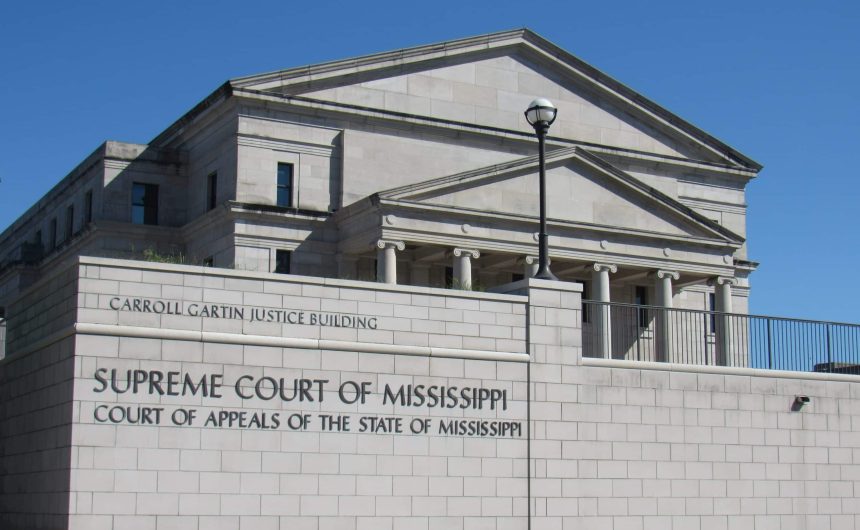While Mississippians have already made their choice for the White House, U.S. House, and U.S. Senate, voters are being asked to return to the polls on Tuesday, Nov. 26 to resolve a pair of judicial races in which no candidates received the vote majority needed.
To make the voting process as seamless as possible, we’ve put together this guide on what to know before heading to the polls.

What races are heading to a runoff?
In the central part of the state, a five-candidate field for the District 1, Position 3 seat on the Mississippi Supreme Court saw none of the candidates surpass the 50% mark during the general election on Nov. 5. Justice Jim Kitchens secured 35.6% of the votes (112,935) as his challenger, GOP state Sen. Jenifer Branning, led the group with 41.8% (132,420).
Kitchens has run a campaign based on his track record through two terms on the Supreme Court. Other experience touted by the incumbent includes 40 years of private practice and nine years as a district attorney in Copiah, Lincoln, Pike, and Walthall counties. If re-elected, Kitchens would be next in line to serve as chief justice.
Branning has used the campaign trail to tout herself as a “constitutional conservative,” raising questions about the nonpartisan status candidates are supposed to carry. However, the state senator in her third term at the capitol promises to be an impartial judge if elected.
Territory covered in District 1 spans from the Alabama border to the Delta region along the Mississippi River and includes 22 counties, with the most populous being Madison and Hinds.
In a District 5, Position 2 Court of Appeals race powered by the Gulf Coast region, razor-thin margins lifted Amy St. Pe’ and Jennifer Schloegel to a runoff. St. Pe’ led the three-candidate field, which also included Ian Baker, with 35.2% of votes (84,769) while Schloegel garnered 33.1% (79,612).
St. Pe’ carries three years of judicial experience after being appointed by the Gautier City Council as a municipal judge in 2021, becoming the first woman to hold the position. In addition, she has served as the city attorney for Moss Point for 16 years.
Schloegel has served as a chancery court judge for Harrison, Hancock, and Stone counties since first being elected in 2010. She was a practicing attorney for 19 years beforehand.
Territory covered in District 5 includes 10 full counties and a portion of another, with the most populous being Harrison and Jackson.
While the seats at stake on Mississippi’s two highest courts combine to cover 33 counties, local runoff elections will be taking place in 16 other counties. Voting information tailored to specific addresses can be found through the secretary of state’s My Election Day portal.
Who gets to vote?
Any voter who registered for the Nov. 5 general election, whether they voted or not, may participate in the general election runoff.
For the Mississippi Supreme Court District 1, Position 3 race, voters from the following counties are being asked to return to the polls: Bolivar, Claiborne, Copiah, Hinds, Holmes, Humphreys, Issaquena, Jefferson, Kemper, Lauderdale, Leake, Madison, Neshoba, Newton, Noxubee, Rankin, Scott, Sharkey, Sunflower, Warren, Washington, and Yazoo.
For the Mississippi Court of Appeals District 5, Position 2 race, voters from the following counties are being asked to return to the polls: Forrest, George, Greene, Hancock, Harrison, Jackson, Lamar, Pearl River, Perry, and Stone along with a portion of Wayne.
Various local runoffs are taking place in Benton, Calhoun, Chickasaw, Coahoma, Jasper, Jones, Lafayette, Leflore, Monroe, Panola, Smith, Tallahatchie, Tishomingo, Union, Webster, and Wilkinson.
When are the polls open?
Polls across Mississippi open Tuesday, Nov. 26 at 7 a.m. and close at 7 p.m. Secretary of State Michael Watson, whose office manages elections, reminds eligible voters that anyone in line before 7 p.m. is legally entitled to cast a ballot. Polling locations can be verified here.
What should you bring to the polls?
Eligible voters should bring a photo ID to their polling location. Voters without an acceptable form of photo identification are entitled to cast an affidavit ballot. However, Secretary Watson urges people to be prepared to vote when they get to the polls, so they won’t have to go through the affidavit process. A list of acceptable photo IDs can be found here. Voters who end up casting an affidavit ballot will be required to present an acceptable form of photo ID to their circuit clerk’s office in the days after the election for their ballot to be counted.
What should you not bring to the polls?
While cell phones are allowed inside polling locations, Mississippi law does not allow people to take a photo of any marked ballot. In the day and age of the fad called “ballot selfies,” Watson reminds people that a social media post is not worth legal repercussions. The secretary of state also reminds people that campaigning within 150 feet of any entrance to a polling location, unless a private property, is unlawful. Thus, don’t bring signs for your candidate of choice and set up outside the door.
Is it too late to vote absentee?
The last day to vote absentee in person was Saturday, Nov. 23. As of last Wednesday, a total of 4,021 ballots had been cast before the runoff election. Mail-in absentee ballots must be postmarked by Election Day to be counted.
What will turnout look like?
In the weeks following the general election, Watson spent a significant time urging voters who were planning to be out of town for the Thanksgiving holiday to go ahead and vote absentee. Though the efforts are worthy of commendation, the secretary of state himself acknowledges a historical drop in voter participation when it comes to runoffs.
For example, the last time a state Supreme Court race advanced to a runoff was in 2016. Nearly 339,000 votes were cast for that seat in the general election before the total fell to about 38,000 for the runoff held later that month.
How to track results?
SuperTalk Mississippi News, in partnership with the Associated Press, will be providing live results online and on 48 stations across the state.







